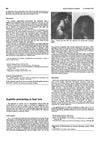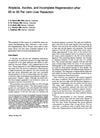Telogen Effluvium
August 2002
in “
Zeitschrift für Hautkrankheiten
”
telogen effluvium iron deficiency zinc deficiency crash diets chronic starvation metabolic disorders malabsorption medication-induced hair loss chronic telogen effluvium androgenetic alopecia oral antiandrogens iron deficiency zinc deficiency crash diets chronic starvation metabolic disorders malabsorption medication-induced hair loss chronic telogen effluvium androgenetic alopecia oral antiandrogens

TLDR Telogen effluvium is a hair loss condition caused by various factors and requires a thorough examination to diagnose and differentiate from other hair loss types.
The 2002 document details telogen effluvium, a form of hair loss where an increased number of hairs enter the telogen phase and shed. It explains that the condition can be triggered by various factors, including iron deficiency, zinc deficiency, crash diets, chronic starvation, metabolic disorders, malabsorption, and certain medications. The onset of medication-induced hair loss typically occurs within 12 weeks of starting the drug. Chronic telogen effluvium, a self-limiting condition lasting at least 6 months, is more prevalent in women aged 30 to 50 and is diagnosed by ruling out other causes. The document emphasizes the importance of a detailed history and clinical examination to diagnose telogen effluvium and differentiate it from other causes of hair loss, such as androgenetic alopecia, which can be treated with oral antiandrogens to slow progression but not regrow lost hair.















